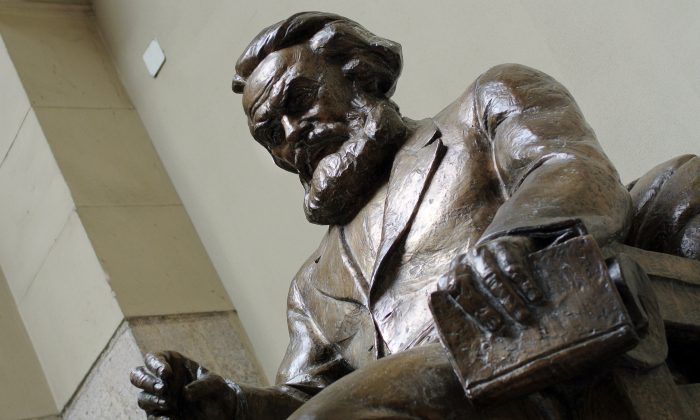Commentary
Marxism’s labor theory of value posits that a commodity’s value is determined by the socially necessary labor time needed to produce it. In this system, labor itself becomes a commodity that can be traded in the market.
Marx asserts that under capitalism, workers are compelled to sell their labor to capitalists who exploit them by paying wages lower than the full value of their labor. This surplus value is then claimed by the capitalist as profit. However, this comparison between labor and commodities reveals significant flaws upon closer examination.
According to Hayek, economic freedom, which includes the ability to choose one’s work and negotiate wages, is crucial for political freedom. His critique suggests that treating labor as a controlled commodity in a planned economy is flawed and detrimental to individual liberty.
Ludwig von Mises, in “Human Action” (1949), criticizes the Marxist view of labor as a commodity from the Austrian school of economics, highlighting the intrinsic link between labor and human choice. Mises argues that labor cannot be treated as a standard commodity as it reflects individual preferences and values, challenging Marx’s oversimplification of labor.
This critique emphasizes the uniqueness of labor and its subjective value, suggesting that Marx’s treatment of labor as a commodity overlooks the complexity of human behavior and economic interactions.
The Strange Case of Labor as a Commodity
Marx considers labor power a commodity sold by workers for wages, but unlike other commodities, labor power is inseparable from the worker. This connection creates contradictions in Marxist theory.
Marx states that labor power is consistently sold below its value, generating surplus value for capitalists. This raises the question of why labor, if treated as a commodity, is the only one sold below its cost. This anomaly challenges the logic of Marxist theory and questions workers’ rationality in accepting less than the market value for their labor.
The idea of workers willingly selling labor below its value contradicts basic economic principles and undermines the credibility of Marxist theory. This illogical depiction of labor as a commodity is demeaning and unrealistic, challenging the foundation of Marxist ideology.
For instance, independent plumbers do not sell their labor power to capitalists but provide services directly to customers. This example highlights the absurdity of treating labor as a commodity.
In this situation, plumbers serve as both the owners of the means of production (tools and skills) and the providers of the service, giving them control over the price of their labor.
According to Marxist theory, self-employed plumbers may be seen as selling their labor power below its value, despite setting their own rates and conditions. This assertion seems illogical, as independent plumbers, acting as their own “capitalists,” would naturally aim to charge prices that cover their expenses and yield a profit. There is no inherent reason for their labor power to be undervalued, making the concept of surplus value irrelevant in this scenario.
Self-employed plumbers are rational economic actors who establish prices based on the value of their work, rather than being considered “stupid businessmen.”
The Socialist Experience: Selling Labor Below Cost
Marxists argue that labor exploitation is intrinsic to capitalism and propose that socialism would address this issue by eliminating private ownership of the means of production. However, the reality in socialist societies like China, Cuba, and the former Soviet Union paints a different picture.
Even in these supposedly Marxist systems, workers continued to exchange their labor for wages, with the state controlling the means of production and determining surplus value distribution. This arrangement did not eradicate the core Marxist criticism of labor being undervalued. In fact, strict adherence to Marxist principles would suggest that this exploitation persisted, with the state assuming the role of the new capitalist and extracting surplus value from workers.
If labor continued to be undervalued under socialism, Marxism not only fails as a critique of capitalism but also falls short as a blueprint for a classless society. The perpetuation of this dynamic in socialist settings indicates fundamental flaws in Marxism, both theoretically and practically.
Marxism as Sophism
The essence of Marxist ideology hinges on labor being viewed as a commodity. Without labor being considered a commodity, the foundational concepts of Marxism—such as surplus value, exploitation, contradictions in capitalism, and the inevitability of socialist revolution—lose their basis.
If labor is not treated as a commodity:
– Surplus value cannot be calculated as Marx envisioned, undermining the idea of capitalist exploitation.
– Exploitation, as defined by Marx, cannot occur without the extraction of surplus value from labor.
– The anticipated contradiction between productive forces and production relations may not exist in the manner Marx theorized, challenging the premise for capitalism’s collapse.
– The rationale for a socialist revolution weakens, as the proletariat may not be enduring the chronic exploitation that Marx believed would spur revolutionary change.
The reliance of Marxism on the flawed notion of labor as a commodity renders it fundamentally unsound. Given the theoretical and practical shortcomings of Marxism, it is reasonable to conclude that Marxism operates as a form of sophism in socioeconomic theory, appearing plausible on the surface but ultimately misleading and unfeasible.
The opinions expressed in this article are those of the author and do not necessarily reflect the views of The Epoch Times.
Source link





